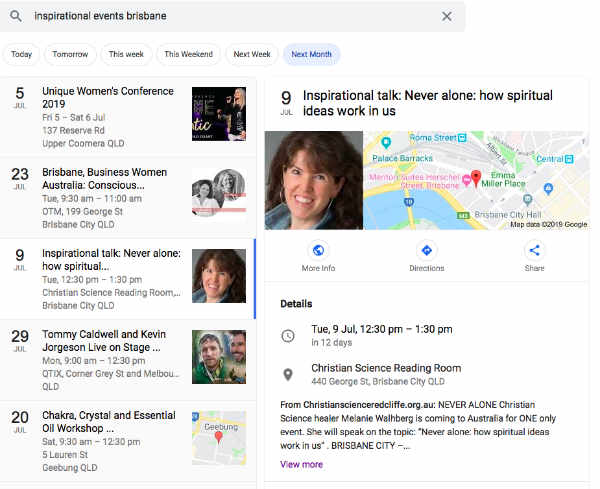Nowadays you can use search engines (predominantly Google) to search for just about anything. A recipe. The address or phone number of a local business. Reserving a table at your favourite restaurant. How to_________ (fill in the blank). In fact, no matter the question, there is a high probability someone has written a blog post on that very topic. And because search engines (especially Google) collect so much data about what people are searching on, they are getting better at delivering the exact information people are seeking.
But what about Christian Science lectures – are people searching for those? My recent research using the Google keyword planner tool showed that “motivational speech” is Googled between 100-1000 times per month in South-East Queensland. “Inspired talks” is Googled between 10-100 times, along with a number of similar phrases. So people are searching for inspirational talks.
How can your branch best reach these online seekers? Here are a couple of ideas that will help you reach a local audience on Google.
-
Paid Google advertising
With a paid Google advertising campaign your ad will appear at the top of the search results in most cases (depending on how many other ads are vying for the same spot). So you don’t have to worry about SEO. But you still have to write the ad and make it compelling enough to click on. (And wrestle with Google Adwords!!!)
Here is an example of a recent ad I placed for one of Wynnum’s lectures:

As you can see, Google ad campaigns allow you to have a number of links to click on, or a phone number to call (many people use their phone to search and this means they can simply click-to-call). These additional links at the bottom increase the exposure of the ad. It’s a great way to get a message directly to people who are searching on certain key phrases, and you can narrow your audience by geographic location too.
-
Using Structured Data Markup on your website
Another really cool way to feature an event such as a lecture in Google is to “markup” your event on your website. This tells Google where to find key information (date, time, address, title, image) on all events on your website. Google then uses this data to list your event, along with other events in your vicinity, that relate to the keywords people are searching on. This article on Forbes.com explains a bit more about marking up.
For example, I marked up this lecture event to be held in Brisbane, and it appears like this whenever anyone Googles “inspirational events Brisbane” or “spiritual events Brisbane” with a handy map and directions, and link to the website:
 The great thing about structured data markup is you only need to do it once. If the data is structured correctly, Google will know where to find the information and will automatically pick up new events whenever it indexes your site.
The great thing about structured data markup is you only need to do it once. If the data is structured correctly, Google will know where to find the information and will automatically pick up new events whenever it indexes your site.
If you’d like to know more about these ideas, or if you’re thinking of setting up a website or landing page to advertise your lecture events and have them appear in Google, please be in touch.
